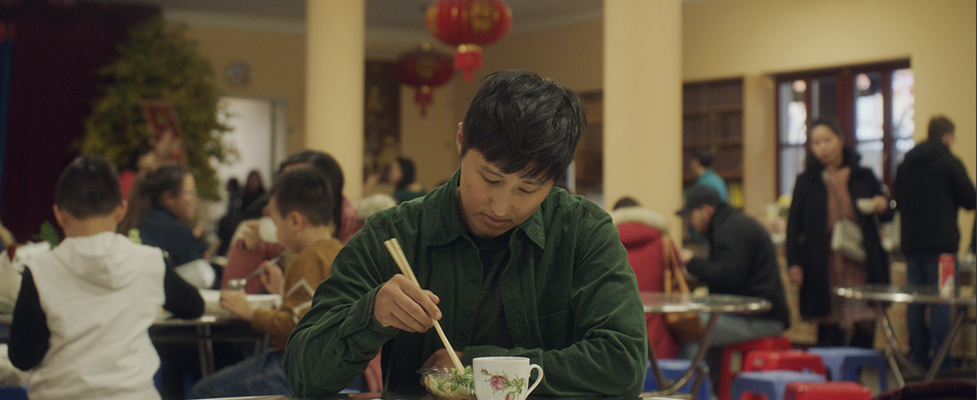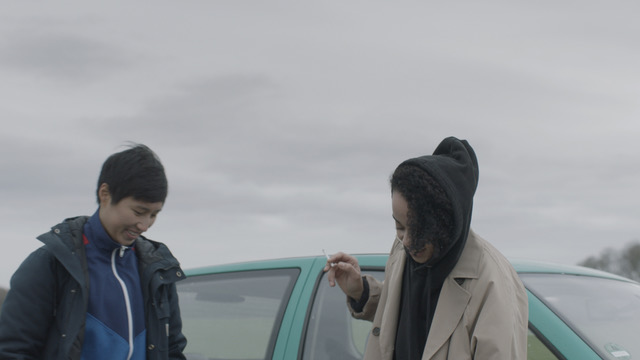“For the 23-year-old Mít life between two worlds is nothing new. Like pushing a button they can change their identity. Changing into the traditional Vietnamese child or the self-determined, queer Berliner,” reads the introduction of the 34min. fiction film JACKFRUIT.
Similar to Mít, the Vietnamese-German film director Nguyễn Thùy Trang is a queer Berliner herself who balances the different worlds in and outside the Vietnamese diaspora. After attending the international film school in Cologne, she created her film JACKFRUIT as the second film in her trilogy that challenges the white gaze on her community. The first film ROAN was also inspired by her grandmother. In both of the films, the audience experiences a glimpse into the struggles of several generations living and breathing in Berlin.

Although JACKFRUIT was initially presented during the national lockdown and had its debut at the Max Ophüls Price Film Festival 2021, Thùy Trang had her first in-person screening this June in Freiburg during the Dear White People Festival which centers topics such as colonialism and racism, environmental, social justice and intersectionality. After the intimate screening and positive resonance from the viewers, we had a chance to speak about her film making process:
Huyen: First off, what brings you joy these days?
Trang: The simple things.
JACKFRUIT as well as your recent film ROAN, both dealt with the relationship between you and your grandmother. Would you mind sharing what kind of relationship you had with her?
We had a very close bond. I grew up with her, since my parents had to work very long shifts. My grandmother and her children came to Berlin in 1984. I was born in 1993. She didn’t speak German so we communicated in Vietnamese. We shared our experiences and shifted our perspectives: She told me of things that reminded her of Vietnam and I taught her German through children’s books. She loved all of her grandchildren equally but she kept repeating that our relationship was destined to be special. We both were born in the year of the rooster, repeating the circle of the zodiac after 60 years and after leaving a world behind.
And then, why was it important for you to preserve that in your films?
When I started filmmaking, I knew I had to tell her story. I started writing the script for ROAN from a perspective of a German grandchild, who knew nothing of Vietnam. I asked her about her childhood and her life during the war. It did not feel right though. She would never go into details, she would change subjects really quickly and she’d happily point out that she was at Disneyland – and not in a bunker. This felt so crucial to me. What needed to be preserved was not the memory of war, but the memory of resilience. Even if her past was painful, it was her softness that touched me the most. So I turned ROAN into a glimpse of an afternoon with my grandmother. And I turned JACKFRUIT into the fictional continuation of that afternoon. Putting it into a bigger perspective, incorporating three different generations and posing the question of what will happen if the generation of my grandmother will fade away. What will be left of me. Not only to keep her in memory but to shape my own (hi)story.
It was amazing to see how you put your queer perspective front and center, how was it for you integrating this topic inside the three generations of women within the context of Vietnamese traditions?
Queerness was always a part of our culture. I’ve learned through Xinans* text, that Quan Âm (chin. Guanyin) is a holy figure with two or no gender. My grandmother used to pray to Quan Âm. Many of my peers and I wish that we would have known earlier. Many people in our generation perceive tradition and modern life as a painful contradiction, I wanted JACKFRUIT to be part of the generational healing process. I wrote a non-binary, queer main character whose motivation is not to come-out but to be the keeper of the family altar. Our authentic reality is very complex. Just like Quan Âm you can be everything, even though it feels like a contradiction.
How was the creation process of writing this screenplay? As well as producing this with an all-people of color production and cast?
I wrote JACKFRUIT as a continuation of ROAN. I had to get it out of my system. It felt truly personal to me. Even more so when I casted Mai Phuong Kollath, Hồng Ngọc Lê and Dần Boldt for the roles of the three women. All of them are amateur actors and actresses. They brought so much more depth to the characters, because they weren’t afraid to work with their own experiences in a family dynamic. I also had the opportunity to document the Têt festivities in Berlin, while improvising with Lê. All of the bits with Boldt were improvised as well. Those scenes gave the movie a very real-life documentary feel which I really like since authenticity was the style I was going for. The main goal was to find out how to represent, instead of only being represented. It challenged all of us to find new visual ways to capture those complex experiences and feelings of identity or familiar belonging.
Who / what are your most significant queer inspirations?
My most significant inspirations are the queer, Asian-American poets Kitty Tsui and Ocean Vuong. Also, the films of Alice Wu and Ang Lee have influenced JACKFRUIT’s style significantly.
Do you have any recommendations or advice for aspiring queer writers and film makers?
Listen to yourself and your intuition. Allow yourself to heal and rest during stressful periods. It doesn’t have to be perfect right away. Set boundaries. Do not try and control the outcome. Control your message behind it. And finally, my last advice for you is to be soft and be brave.

To watch the short film: JACKFRUIT is currently available on CineAsianFilms.
*Xinan is the co-founder of the Asian German diasporia podcast Diaspor.asia.
Contributors’ Bios
Thùy Trang Nguyễn (*1993 Berlin) is a Vietnamese German filmmaker. She has been studying Directing at the International Film School Cologne since 2017. Her films challenge viewing habits by telling stories about the empowerment of queer BIPOC’s and the conservation of cultural heritage. Since 2012 she has been working as an assistant director, dialogue coach, diversity reader, caster and editor for fictional and documentary feature films. In 2010 she was a founding member of the non-profit organization BERLIN ASIAN FILMNETWORK (BAFNET).
Thi Minh Huyen Nguyen (*1992 Speyer, Rhineland-Palatinate) is a freelance author and researches Vietnamese identity in the global diaspora. In 2011 she founded her blog “Gold to Green”. With a B.A. in Media and Communication Science from the University of Mannheim, she spent a total of 5 years in the USA, most recently in the sports and marketing industry in New York City. As a co-founder of WAYV RUN KOLLEKTIV, she’s empowering BIPOC/LGBTQI* communities inside and outside of running. When Huyen is not writing or running, she volunteers for anti-racism projects like “IchbinkeinVirus.org” and advocates for intersectional feminism with projects like BIWOC* Rising.


